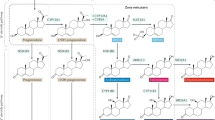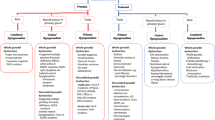Abstract
IN most mammalian species the principal steroid product of the testes is testosterone, 17α-hydroxyandrost-4-en-3-one. In addition to being one of the most potent naturally occurring androgens it has been considered to be the active form of the hormone at target tissue level. Recent reports suggest, however, that a metabolite of testosterone, 17α-hydroxy-5-androstan-3-one (5α-dihydrotestosterone (5α-DHT)), may be the active form of the hormone1,2. Several target organs (prostate, seminal vesicle and penis) rapidly convert testosterone to 5α-DHT (refs. 1 and 2). This conversion occurs before the attachment of the hormone to the receptors3 and seems to be essential for subsequent protein synthesis. Additional evidence for this function of 5α-DHT comes from studies on patients with testicular feminization; tissue biopsies from the genital organs of such patients cannot convert testosterone to 5KDNT (ref. 4). Testosterone can also activate both male and female sexual behaviour and is more potent than oestrogens in inducing libido in women5. Recently the enzyme system needed to convert testosterone to 5α-DHT has been demonstrated in the hypothalamus of the rat and dog6,7, which suggests that 5α-DHT may also be the active form of testosterone in inducing sexual behaviour. In the ovariectomized female rabbit, however, 5α-DHT is devoid of any oestrus-inducing properties at doses from 2–20 mg per day8. 5α-DHT cannot be converted to oestrogenic metabolites in vivo9, which suggests that the aromatization of androgens may be of significance in the activation of sexual behaviour. This preliminary report concerns the failure of 5-DHT to initiate sexual behaviour in the castrated male rat.
This is a preview of subscription content, access via your institution
Access options
Subscribe to this journal
Receive 51 print issues and online access
$199.00 per year
only $3.90 per issue
Buy this article
- Purchase on Springer Link
- Instant access to full article PDF
Prices may be subject to local taxes which are calculated during checkout
Similar content being viewed by others
References
Bruchovsky, N., and Wilson, J. D., J. Biol. Chem., 243, 2012 (1968).
Balieu, E., Lasnitzki, I., and Robel, P., Nature, 219, 1155 (1968).
Belham, J. E., Neal, G. E., and Williams, D. C., Biochem. J., 114, 32P (1969).
Northcutt, R. C., Island, D. P., and Liddle, G. W., J. Clin. Endocr. Metab., 29, 422 (1969).
Young, W. C., in Sex and Internal Secretions (edit. by Young, W. C.), 2, 1196 (Williams and Wilkins, Baltimore, 1961).
Jaffe, R. B., Abst. Fifty-first Meeting Endocrine Soc., 43 (1969).
Perez-Palacios, G., Castaneda, E., Gomez-Perez, F., Perez, A. E., and Gual, C., VIII Reunion de la Soc. Mex. de Nut. y Endocrinol. (1969).
Beyer, C., McDonald, P. G., and Vidal, N., Endocrinology (in the press).
Ryan, K. J., Acta Endocrinol. (suppl. 51), 35, 697 (1960).
Dorfman, R. I., and Ungar, F., Metabolism of Steroid Hormones (Academic Press, New York, 1965).
Author information
Authors and Affiliations
Rights and permissions
About this article
Cite this article
MCDONALD, P., BEYER, C., NEWTON, F. et al. Failure of 5α-Dihydrotestosterone to initiate Sexual Behaviour in the Castrated Male Rat. Nature 227, 964–965 (1970). https://doi.org/10.1038/227964a0
Received:
Revised:
Issue Date:
DOI: https://doi.org/10.1038/227964a0
This article is cited by
-
Role of the androgen receptor in breast cancer and preclinical analysis of enzalutamide
Breast Cancer Research (2014)
-
Cryptic confounding compounds: a brief consideration of the influences of anthropogenic contaminants on courtship and mating behavior
acta ethologica (2013)
-
Persistence of infertility in GnRH immunized male rats treated with subdermal implants of dihydrotestosterone (DHT)
Endocrine (1996)
Comments
By submitting a comment you agree to abide by our Terms and Community Guidelines. If you find something abusive or that does not comply with our terms or guidelines please flag it as inappropriate.



